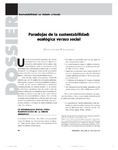
Please use this identifier to cite or link to this item:
http://ricaxcan.uaz.edu.mx/jspui/handle/20.500.11845/232Full metadata record
| DC Field | Value | Language |
|---|---|---|
| dc.contributor.other | 0000-0002-7441-3233 | |
| dc.coverage.spatial | Global | es_ES |
| dc.creator | Foladori, Guillermo | |
| dc.date.accessioned | 2017-05-16T14:00:54Z | |
| dc.date.available | 2017-05-16T14:00:54Z | |
| dc.date.issued | 2007-05 | |
| dc.identifier.issn | 2007-1205 | es_ES |
| dc.identifier.uri | http://hdl.handle.net/20.500.11845/232 | |
| dc.description | This study considers the paradox between the improvement of some of the environmental indexes in first world countries during the last few years and the increment of injustice and infectious diseases around the world. Within sustainable development, we are living partial improvements in ecological sustainability and a decline in social sustainability. As a rule, environmental proposals are trapped within ecological sustainability, thinking that environmental improvements will automatically translate into social improvements. By not discussing the capitalistic relations that encompass every environmental policy, environmental proposals are reduced into a technical view limited to ecological sustainability. This article claims the need for an alternative approach that analyzes environmental problematic from a class-conscious perspective and favors social sustainability over ecological sustainability. | es_ES |
| dc.description.abstract | Este estudio explica la paradoja entre la mejora, en los últimos años, en algunos indicadores ambientales de los países más desarrollados, y el incremento de la inequidad y las enfermedades infecciosas en el mundo. En el lenguaje del desarrollo sustentable, vivimos parciales avances en la sustentabilidad ecológica y retrocesos en la sustentabilidad social. Al hacerlo muestra que, por lo regular, las propuestas ambientalistas quedan atrapadas en la sustentabilidad ecológica, creyendo que las mejoras ambientales se traducirán, automáticamente, en mejoras sociales. Al no discutir las relaciones capitalistas bajo las cuales todas las políticas ambientales se enmarcan, las propuestas ambientalistas quedan reducidas a una visión técnica y limitada a la sustentabilidad ecológica. El artículo reivindica la necesidad de un enfoque alternativo que analice la problemática ambiental desde una perspectiva clasista, y privilegie la sustentabilidad social sobre la ecológica. | es_ES |
| dc.language.iso | spa | es_ES |
| dc.publisher | Universidad Autónoma de Nuevo León | es_ES |
| dc.relation | http://trayectorias.uanl.mx/24/paradojas.htm | es_ES |
| dc.relation.uri | generalPublic | es_ES |
| dc.rights | Attribution-NonCommercial-ShareAlike 3.0 United States | es_ES |
| dc.rights.uri | http://creativecommons.org/licenses/by-nc-sa/3.0/us/ | * |
| dc.source | Trayectorias. Año IX, No. 24 mayo-agosto | es_ES |
| dc.subject.classification | CIENCIAS AGROPECUARIAS Y BIOTECNOLOGIA [6] | es_ES |
| dc.subject.other | info:eu-repo/classification/Sustentabilidad, | |
| dc.subject.other | info:eu-repo/classification/Capitalismo | |
| dc.subject.other | info:eu-repo/classification/Ecología | |
| dc.title | Paradojas de la sustentabilidad: ecológica versus social | es_ES |
| dc.type | info:eu-repo/semantics/article | es_ES |
| Appears in Collections: | *Documentos Académicos*-- UA Estudios del Desarrollo | |
Files in This Item:
| File | Description | Size | Format | |
|---|---|---|---|---|
| Foladori, Guillermo. Paradojas de la sustentabilidad.pdf | Versión publicada | 236,14 kB | Adobe PDF |  View/Open |
This item is licensed under a Creative Commons License
